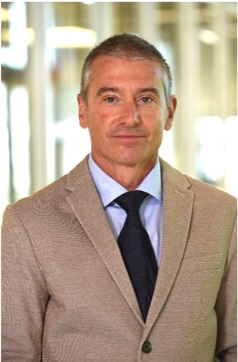Department of Nuclear Engineering

All Events
- This event has passed.
[Seminar] An Overview of the DOE-NE Advanced Sensor and Instrumentation Program
October 13, 2022 @ 4:00 pm - 5:00 pm
Event Navigation
 Dr. Pattrick Calderoni
Dr. Pattrick Calderoni
National Technical Director
DOE Advanced Sensors and Instrumentation Program
Idaho National Laboratory
Abstract
In 2011, the Department of Energy’s Office of Nuclear Energy (DOE-NE) initiated the Nuclear Energy Enabling Technologies (NEET) initiative to conduct research, development, and demonstration (RD&D) in crosscutting technologies that directly support current reactors and enable the development of new and advanced reactor designs and fuel cycle technologies. The Advanced Sensors and Instrumentation (ASI) program is the element of NEET dedicated to Instrumentation and Control (I&C) technology.
The ASI Program has spurred innovation in the measurement science field by funding research to advance the nuclear industry’s monitoring and control capability. These capabilities are crucial in developing research solutions that enable reduced costs, improved efficiencies, and increased safety for advanced reactors operations. They also serve a vital role in Materials Test Reactors (MTR) to measure environmental conditions of irradiation experiments and to monitor aspects of advanced fuel and
materials behavior that in turn contribute to accelerate deployment of advanced nuclear systems.
The ASI program is coordinated with DOE-NE’s other research and development (R&D) programs to ensure that developed technologies and capabilities are part of an integrated investment strategy aimed
at improving the safety, reliability, and competitiveness of domestic nuclear technologies. The ASI program provides the crosscutting technologies research in four main areas:
1. Sensors and Instrumentation. Research and develop reliable and cost-effective instruments to provide real-time, accurate, and high-resolution measurements of the performance of existing and advanced reactors’ core and plant systems.
2. Advanced Control Systems. Research and develop real-time control of plant or experimentation process variables to enhance performance and reduce operation and maintenance (O&M) costs through advanced risk-informed approaches to monitoring and control.
3. Nuclear Plant Communication. Research and develop a resilient, secure, and real-time transmission of sufficient data enabling online monitoring, advanced control strategies, and big data analytics.
4. Big Data Analytics, Machine Learning, and Artificial Intelligence: Research and develop machine learning and artificial intelligence capabilities to enable autonomous operations and maintenance by design using heterogeneous and unstructured data.
This contribution highlights the accomplishments of the program research activities in recent years in all four research areas. Technical outcomes are discussed, with focus on the development of innovative sensor technologies for in-core instrumentation and their demonstration in irradiation experiments to reach operational conditions relevant to advanced reactors (including combined temperature and neutron flux). This includes demonstration test of mature technologies aimed at extending operational boundaries (for example, thermocouples and self-powered neutron detectors) and proof of feasibility of lower readiness technologies for nuclear applications, such as optical fiber and acoustic sensors. The ASI program engagement with other DOE programs and industrial partners is also discussed to emphasize the role of innovative I&C solutions to the deployment of advanced reactors, with focus on transportable, small footprint systems with less than 20 MWth energy output (microreactors).
Biography
Pattrick Calderoni is the National Technical Director of the Advanced Sensor and Instrumentation program, which is an element of the Department of Energy, Nuclear Energy research portfolio. He also acts as the Senior Technical Advisor for the Idaho National Laboratory Fusion Safety Program. Dr. Calderoni has more than 20 years’ experience in the development of fission and fusion energy systems and testing of nuclear components. In addition to sensors, his technical expertise includes molten salt reactors and tritium technology. He holds a B.S. in Nuclear Engineering and has received his Ph.D. and M.S. in Mechanical Engineering from the University of California, Los Angeles.
Thursday, October 13. 2022
4:00 pm seminar
Hybrid Option (Speaker is in person)
zoom (link upon request)
or
Room 1202 Burlington Labs

![[Seminar] Modeling Advanced Reactors: Lesson Learnt and Some Personal Perspectives](https://www.ne.ncsu.edu/wp-content/plugins/events-calendar-pro/src/resources/images/tribe-related-events-placeholder.png)